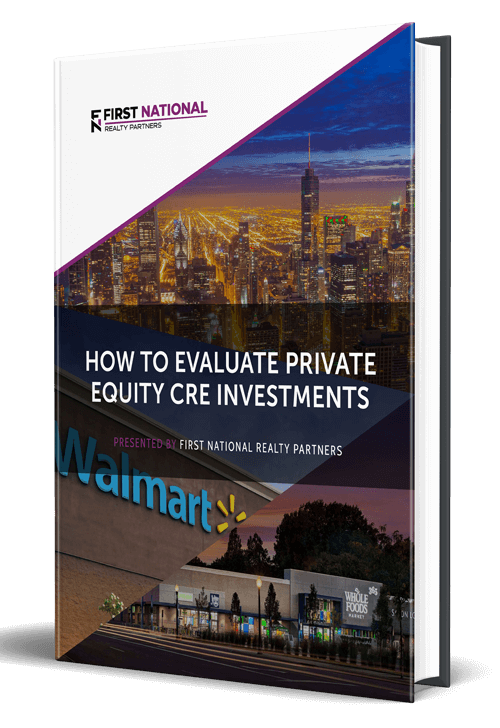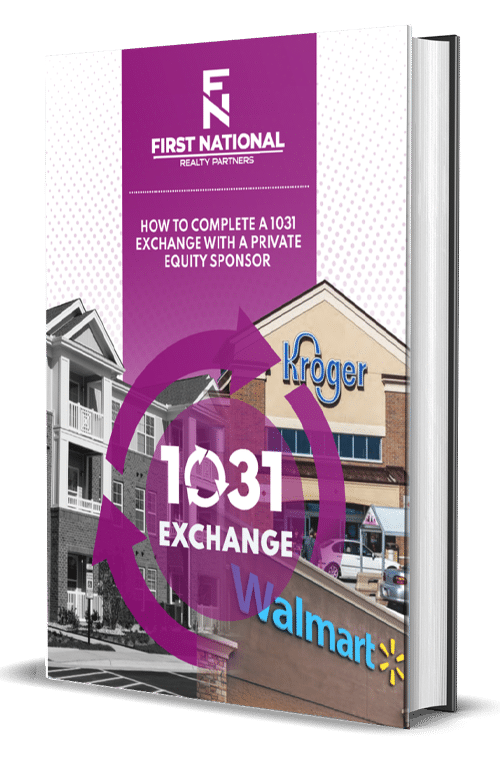Navigating the Transition from Residential to Commercial Real Estate Investment
Individuals making a first time real estate investment often begin with a residential rental property acquisition to jump start their investing career. Purchasing a condominium, single-family home, or duplex can be a good introduction to earning rental income and experiencing the responsibilities associated with managing a real estate investment. However, trying to grow a portfolio from one residential property to many can be a daunting task because residential real estate investments can be tough to scale and time intensive to manage, especially if they’re located in multiple markets.
For those looking to accelerate the growth of their portfolio or to take a more passive management role, a transition from residential to commercial real estate investment is a logical next step, but it can be daunting due to the larger scale, complexity, and investment requirements. It doesn’t have to be.
Residential vs. Commercial Real Estate, Pros and Cons
Residential real estate is an asset class unto itself characterized by the purchase of real property associated with where people live. Purchasing a single-family home is the most common type of residential real estate investment, but condominiums, undeveloped land, townhomes, duplexes, and triplexes also qualify as residential real estate. In most cases, an investor’s intent is to purchase the property and rent it out to someone else for income.
Commercial real estate is a distinctly different asset class characterized by the purchase of real property where business is conducted and it’s divided into four categories, depending on the property’s function:
- Office: One or more buildings designed for the needs of operating a business. Examples include general office space, like a highrise, or specialized office space like medical or dental.
- Industrial: Property designed to accommodate an “industrial’ purpose such as standalone distribution warehouses, factories, or “Flex” spaces.
- Multifamily: There’s a distinct difference between residential multifamily, which is less than four units, and commercial multifamily which is five or more housing units contained within the same building or cluster of buildings.
- Retail: Property that houses tenants who engage in direct to consumer sales activities. Examples include shopping malls, strip centers, and stand alone bank branches.
A residential real estate investment is a good option for first-timers because the capital requirements are low, relatively speaking, and it offers a series of benefits including stable income, price appreciation, depreciation write-offs, and the opportunity to build equity with “OPM” – other people’s money.
However, for an investor looking to build a portfolio at scale, there are real efficiency challenges to managing a geographically diverse property portfolio including things like chasing late payments, basic maintenance, and regular inspections. In addition, leases tend to be short term (~12 Months) and tenant turnover tends to be high.
Conversely, a commercial real estate investment offers the opportunity to build economies of scale because multiple units are often located within the same building and back office functions like accounting and finance can be centralized and spread over multiple assets. Additionally, multi-year leases provide stable, long term income and commercial real estate tends to be a good hedge against stock market movements.
But, they’re often illiquid and require high levels of upfront investment, which creates barriers to entry and makes the transition from residential to commercial investing difficult.
Navigating the Transition from Residential to Commercial Real Estate Investing
With a residential investment, there are three ways to profit:
- Price Appreciation: Real estate is a physical asset that, historically speaking, gains value slowly over time, creating equity, which is the difference between a property’s value and it’s loan balance.
- Income / Cash Flow: When rented, a property’s lease payments produce income for the owner and the difference between the income and expenses (including the loan) is known as cash flow. Over time, cash flow positive properties add another layer of return to the investment.
- Loan Amortization: Assuming the investment is financed with amortizing debt, the tenant’s monthly payment serves to reduce the loan balance a little bit each month in a process known as loan amortization. In an ideal scenario, the loan balance goes down while the property value goes up, accelerating the growth of equity in the property.
Due to the increased capital requirements, the transition from residential to commercial investing can be tough. But, implementing a stable, disciplined residential strategy over a long period of time can allow a residential investor to harvest returns from the above sources and successfully deploy them into a commercial investment.
However, the transition from residential to commercial isn’t just about the larger amounts of money involved. Commercial investing requires highly specialized knowledge and familiarity with the financial concepts and metrics used to measure returns. To navigate the knowledge gap, there are a few best practices:
- Study & Learn: Utilizing all available resources such as the internet, seminars, and text books, it’s advisable to learn as much as possible about the nuances of specific asset classes and the metrics used to measure their returns. Concepts like IRR and the Debt Service Coverage Ratio are universal and should be committed to memory.
- Develop Relationships: It’s always a good idea to develop relationships with brokers, appraisers, bankers, and developers in markets of interest. Doing so will breed familiarity with the market and the players within it. It’ll also provide exposure to the lingo used to analyze commercial real estate transactions.
- Partner with Experts: More so than residential investing, commercial real estate is a team effort and requires the collective knowledge and individual expertise of a diverse team of people. Partnering with experts provides both an opportunity to learn and a way to gain entry to deals as part of a partnership or group of investors.
First National Realty Partners – How We Can Help
Whether you’re thinking about buying your first commercial property or looking to navigate the transition from residential to commercial real estate investment, our experienced investment team is here to assist.
First National Realty Partners is one of the country’s leading private equity commercial real estate investment firms. With an intentional focus on finding world-class, multi-tenanted assets well below intrinsic value, we seek to create superior long-term, risk-adjusted returns for our investors while creating strong economic assets for the communities we invest in.
Through our decades of experience, we’ve established a consistent and repeatable three-step investment approach:
- Buy it – We acquire high-quality, income-producing assets at discounts to replacement costs
- Fix it – We rapidly and proactively address any capital structure, physical, or operating issues pertaining to the investment
- Exit – Once issues are addressed we refinance the investments and hold them for the long term. Our average hold period prior to refinancing is slightly more than three years
If you’re an individual investor considering an investment in a retail shopping center, it’s essential to work with a team that can guide your investment decision and we’d like to be the team to do it. To learn more about our investment philosophy and shopping center opportunities, please contact us at (800) 605-4966 or info@fnrpusa.com.






